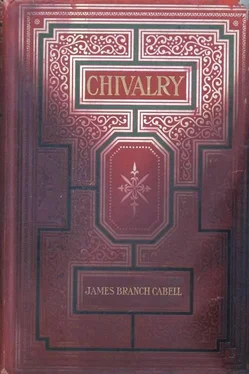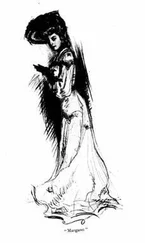James Cabell - Chivalry
Здесь есть возможность читать онлайн «James Cabell - Chivalry» весь текст электронной книги совершенно бесплатно (целиком полную версию без сокращений). В некоторых случаях можно слушать аудио, скачать через торрент в формате fb2 и присутствует краткое содержание. Жанр: Фэнтези, на английском языке. Описание произведения, (предисловие) а так же отзывы посетителей доступны на портале библиотеки ЛибКат.
- Название:Chivalry
- Автор:
- Жанр:
- Год:неизвестен
- ISBN:нет данных
- Рейтинг книги:3 / 5. Голосов: 1
-
Избранное:Добавить в избранное
- Отзывы:
-
Ваша оценка:
- 60
- 1
- 2
- 3
- 4
- 5
Chivalry: краткое содержание, описание и аннотация
Предлагаем к чтению аннотацию, описание, краткое содержание или предисловие (зависит от того, что написал сам автор книги «Chivalry»). Если вы не нашли необходимую информацию о книге — напишите в комментариях, мы постараемся отыскать её.
Chivalry — читать онлайн бесплатно полную книгу (весь текст) целиком
Ниже представлен текст книги, разбитый по страницам. Система сохранения места последней прочитанной страницы, позволяет с удобством читать онлайн бесплатно книгу «Chivalry», без необходимости каждый раз заново искать на чём Вы остановились. Поставьте закладку, и сможете в любой момент перейти на страницу, на которой закончили чтение.
Интервал:
Закладка:
So in a month it was settled. Alphonso would give his sister to de Gâtinais, and in exchange get the latter's vote; and Gui Foulques of Sabionetta—now Clement, fourth Pope to assume that name—would annul the previous marriage, they planned, and in exchange get an armament to serve him against Manfred, the late and troublesome tyrant of Sicily and Apulia. The scheme promised to each one of them that which he in particular desired, and messengers were presently sent into Ponthieu.
It is now time we put aside these Castilian matters and speak of other things. In England, Prince Edward had fought, and won, a shrewd battle at Evesham; the barons' power was demolished, there would be no more internecine war; and spurred by the unaccustomed idleness, he began to think of the foreign girl he had not seen since the day he wedded her. She would be a woman by this, and it was befitting that he claim his wife. He rode with Hawise d'Ebernoe to Ambresbury, and at the gate of the nunnery they parted, with what agonies are immaterial to this history's progression; the tale merely tells that latterly the Prince went into Lower Picardy alone, riding at adventure as he loved to do, and thus came to Entréchat, where his wife resided with her mother, the Countess Johane.
In a wood near the castle he approached a company of Spaniards, four in number, their horses tethered while these men (Oviedans, as they told him) drank about a great stone which served them for a table. Being thirsty, he asked and was readily accorded hospitality, so that within the instant these five fell into an amicable discourse. One fellow asked his name and business in those parts, and the Prince gave each without hesitancy as he reached for the bottle, and afterward dropped it just in time to catch, cannily, with his naked left hand, the knife-blade with which the rascal had dug at the unguarded ribs. The Prince was astounded, but he was never a subtle man: here were four knaves who, for reasons unexplained—but to them of undoubted cogency—desired the death of Sire Edward, the King of England's son: and manifestly there was here an actionable difference of opinion; so he had his sword out and presently killed the four of them.
Anon there came to him an apple-cheeked boy, habited as a page, who, riding jauntily through the forest, lighted upon the Prince, now in bottomless vexation. The lad drew rein, and his lips outlined a whistle. At his feet were several dead men in a very untidy condition. And seated among them, as throned upon the boulder, was a gigantic and florid person, so tall that the heads of few people reached to his shoulder; a person of handsome exterior, blond, and chested like a stallion, whose left eyebrow drooped so oddly that even in anger the stupendous man appeared to assure you, quite confidentially, that the dilapidation he threatened was an excellent jest.
"Fair friend," said the page. "God give you joy! and why have you converted this forest into a shambles?"
The Prince told him of the half-hour's action as has been narrated. "I have perhaps been rather hasty," he considered by way of peroration, "and it vexes me that I did not spare, say, one of these lank Spaniards, if only long enough to ascertain why, in the name of Termagaunt, they should have desired my destruction."
But midway in his talc the boy had dismounted with a gasp, and he was now inspecting the features of one carcass. "Felons, my Prince! You have slain some eight yards of felony which might have cheated the gallows had they got the Princess Ellinor safe to Burgos. Only two days ago this chalk-eyed fellow conveyed to her a letter."
Prince Edward said, "You appear, lad, to be somewhat over heels in the confidence of my wife."
Now the boy arose and defiantly flung back his head in shrill laughter. "Your wife! Oh, God ha' mercy! Your wife, and for ten years left to her own devices! Why, look you, to-day you and your wife would not know each other were you twain brought face to face."
Prince Edward said, "That is very near the truth." But, indeed, it was the absolute truth, and as concerned himself already attested.
"Sire Edward," the boy then said, "your wife has wearied of this long waiting till you chose to whistle for her. Last summer the young Prince de Gâtinais came a-wooing—and he is a handsome man." The page made known all which de Gâtinais and King Alphonso planned, the words jostling as they came in torrents, but so that one might understand. "I am her page, my lord. I was to follow her. These fellows were to be my escort, were to ward off possible pursuit. Cry haro, beau sire! Cry haro, and lustily, for your wife in company with six other knaves is at large between here and Burgos—that unreasonable wife who grew dissatisfied after a mere ten years of neglect."
"I have been remiss," the Prince said, and one huge hand strained at his chin; "yes, perhaps I have been remiss. Yet it had appeared to me— But as it is, I bid you mount, my lad!" he cried, in a new voice.
The boy demanded, "And to what end?"
"Oy Dieus, messire! have I not slain your escort? Why, in common reason, equity demands that I afford you my protection so far as Burgos, messire, just as equity demands I on arrival slay de Gâtinais and fetch back my wife to England."
The page wrung exquisite hands with a gesture which was but partially tinged with anguish and presently began to laugh. Afterward these two rode southerly, in the direction of Castile.
For it appeared to the intriguing little woman a diverting jest that in this fashion her husband should be the promoter of her evasion. It appeared to her more diverting when in two days' space she had become genuinely fond of him. She found him rather slow of comprehension, and was namelessly humiliated by the discovery that not an eyelash of the man was irritated by his wife's decampment; he considered, to all appearances, that some property of his had been stolen, and he intended, quite without passion, to repossess himself of it, after, of course, punishing the thief.
This troubled the Princess somewhat; and often, riding by his more stolid side, the girl's heart raged at memory of the decade so newly overpast which had kept her always dependent on the charity of this or that ungracious patron—on any one who would take charge of her while the truant husband fought out his endless squabbles in England. Slights enough she had borne during the period, and squalor, and hunger even. But now at last she rode toward the dear southland; and presently she would be rid of this big man, when he had served her purpose; and afterward she meant to wheedle Alphonso, just as she had always done, and later still she and Etienne would be very happy; and, in fine, to-morrow was to be a new day.
So these two rode ever southward, and always Prince Edward found this new page of his—this Miguel de Rueda—a jolly lad, who whistled and sang inapposite snatches of balladry, without any formal ending or beginning, descanting always with the delicate irrelevancy of a bird-trill.
Sang Miguel de Rueda:
" Lord Love, that leads me day by day
Through many a screened and scented way,
Finds to assuage my thirst
No love that may the old love slay,
None sweeter than the first.
" Ah, heart of mine, that beats so fast
As this or that fair maid trips past,
Once and with lesser stir
We spied the heart's-desire, at last,
And turned, and followed her.
" For Love had come that in the spring
When all things woke to blossoming
Was as a child that came
Laughing, and filled with wondering,
Nor knowing his own name—"
"And still I would prefer to think," the big man interrupted, heavily, "that Sicily is not the only allure. I would prefer to think my wife so beautiful— And yet, as I remember her, she was nothing extraordinary."
Читать дальшеИнтервал:
Закладка:
Похожие книги на «Chivalry»
Представляем Вашему вниманию похожие книги на «Chivalry» списком для выбора. Мы отобрали схожую по названию и смыслу литературу в надежде предоставить читателям больше вариантов отыскать новые, интересные, ещё непрочитанные произведения.
Обсуждение, отзывы о книге «Chivalry» и просто собственные мнения читателей. Оставьте ваши комментарии, напишите, что Вы думаете о произведении, его смысле или главных героях. Укажите что конкретно понравилось, а что нет, и почему Вы так считаете.



